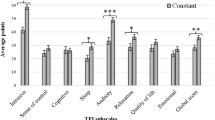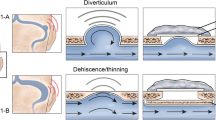Abstract
Our objective was to determine the effect of different types of otologic surgeries on tinnitus symptoms. Our study consisted of 63 patients who were operated between January and June 2011. Variables such as age, sex, presence of systemic diseases, location and size of the perforation, duration of dry period, type of otological surgery, peroperative presence of cholesteatoma, timpanosclerotic plaques and ossicular chain discontinuity were evaluated. Audiologic evaluation by pure tone audiometry and assessment of THI scores were conducted before surgery and 12 weeks after surgery. There was a very significant difference between preoperative and postoperative mean THI scores (p < 0.01). There was no significant effect of presence of ossicular discontinuity, cholesteatoma, tympanosclerotic plaques, type of surgery or duration of symptoms on the difference of preoperative and postoperative THI scores (p > 0.05). There was a significant positive relationship between audiological gain and THI scores (r = 0.355, p < 0.01). In our study, we investigated the relationship between many types of otological surgeries including some preoperative and peroperative pathological findings and tinnitus. As a result, we found that postoperative audiologic gain is an important factor determining outcome of tinnitus in these types of otological surgeries.

Similar content being viewed by others
References
Henry JA, Dennis KC, Schechter MA (2005) General review of tinnitus: prevalence, mechanisms, effects, and management. J Speech Lang Hear Res 48:1204–1235
Fornaro M, Martino M (2010) Tinnitus psychopharmacology: a comprehensive review of its pathomechanisms and management. Neuropsychiatr Dis Treat 24:209–218
Crummer RW, Hassan GA (2004) Diagnostic approach to tinnitus. Am Fam Physician 69:120–126
Del Bo L, Ambrosetti U (2007) Hearing aids for the treatment of tinnitus. Prog Brain Res 166:341–345
Lim JJ, Lu PK, Koh DS, Eng SP (2010) Impact of tinnitus as measured by the Tinnitus Handicap Inventory among tinnitus sufferers in Singapore. Singapore Med J 51:551–557
Sweetow RW, Levy MC (1990) Tinnitus severity scaling for diagnostic/therapeutic usage. Hear Instrum 41:20–21
Kuk FK, Tyler RS, Russell D et al (1990) The psychometric properties of a tinnitus handicap questionnaire. Ear Hear 11:434–445
Halford JB, Anderson SD (1991) Tinnitus severity measured by a subjective scale, audiometry and clinical judgement. J Laryngol Otol 105:89–93
Wilson PH, Henry J, Bowen M et al (1991) Tinnitus reaction questionnaire: psychometric properties of a measure of distress associated with tinnitus. J Speech Hear Res 34:197–201
Hallam RS (1996) Manual of the tinnitus questionnaire (TQ). Psychological Corporation, London
Newman CW, Jacobson GP, Spitzer JB (1996) Development of the tinnitus handicap ınventory. Arch Otolaryngol Head Neck Surg 122:143–148
Newman CW, Sandridge SA, Jacobson GP (1998) Psychometric adequacy of the tinnitus handicap ınventory (THI) for evaluating treatment outcome. J Am Acad Audiol 9:153–160
Lima Ada S, Sanchez TG, Bonadia Moraes MF et al (2007) The effect of timpanoplasty on tinnitus in patients with conductive hearing loss: a six month follow-up. Braz J Otorhinolaryngol 73:384–389
Kim DK, Park SN, Kim MJ et al (2011) Tinnitus in patients with chronic otitis media before and after middle ear surgery. Eur Arch Otorhinolaryngol 268:1443–1448
Schaette R, Turtle C, Munro KJ (2012) Reversible induction of phantom auditory sensations through simulated unilateral hearing loss. PLoS ONE 7(6):e35238
Baba S, Yagi T, Fujikura T (2004) Subjective evaluation and overall satisfaction after tympanoplasty for chronic simple suppurative otitis media. J Nihon Med Sch 71:17–24
Saito T, Kimura Y, Yamada T et al (1999) Efficacy of middle ear surgery for patients with hearing aids and middle ear disease. Nihon Jibiinkoka Gakkai Kaiho 102:347–353
Sachio T, Hiroshi K, Chie K et al (1999) Tympanoplasty and tinnitus. Practica Otologica 92:845–850
Acknowledgment
This study was presented as a poster in 33.Turk National Otorhinolaryngology-Head and Neck Surgery congress.
Conflict of interest
We do not have any conflict or interest.
Author information
Authors and Affiliations
Corresponding author
Rights and permissions
About this article
Cite this article
Habesoglu, M., Habesoglu, T.E., Karatas, C. et al. Is there any predictor for tinnitus outcome in different types of otologic surgery?. Eur Arch Otorhinolaryngol 270, 2225–2229 (2013). https://doi.org/10.1007/s00405-012-2271-5
Received:
Accepted:
Published:
Issue Date:
DOI: https://doi.org/10.1007/s00405-012-2271-5




